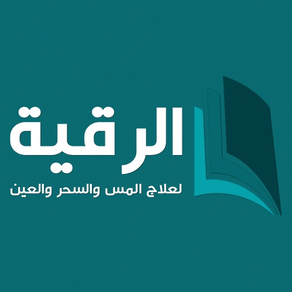
الرقية الشرعية
무료
1.1for iPhone, iPod touch
International Waqf Foundation
Developer
80.2MB
Size
Dec 12, 2015
Update Date
Reference
Category
17+
Age Rating
Age Rating
الرقية الشرعية 스크린 샷
About الرقية الشرعية
Ruqyah (plural: ruqa) derives from the past-tense verb raqa. It consists of words said or written in the form of dud or Dhikr for the purpose of protection or cure. It is sometimes accompanied with other actions, such as blowing or wiping over the thing ich it is applied.
A synonym for ruqyah in Arabic is "ta'with" and "ta'withah", from which derives the description "al-Mu'awwidhat" (the protecting ones) for the last three suras of the Qur'an, and "al-Mu'awwidhatan" (the two protecting ones) for the last two suras only (cited below).
People from most cultures and religions use various forms of ruqa. They are usually referred to in English as spells, charms, incantations, and so on. Most of those ruqa contain magic, shirk, senseless words, lies, etc. Because of this, the Prophet (Peace and Blessing upon Him) prohibited using ruqa at first. Ibn Masud (RA) reported that the Prophet (Peace and Blessing upon Him) said:
'Indeed, ruqa, amulets, and tiwala*, are all acts of shirk.' Recorded by Ahmad, Abu Dawud, and others. Verified to be authentic by al-Albani in as-Sahihah no. 331.
(*Tiwala: Beads or other objects, usually worn around the neck, believed by some people to have the power of making a husband love his wife.)
Later on, he (Peace and Blessing upon Him) allowed people to use only the ruqa that he approved, or that did not contain shirk. Jabir Bin 'Abdillah (RA) reported that Allah's Messenger (Peace and Blessing upon Him) prohibited ruqa. Then, some people from the tribe of 'Umr Bin Hazam came to him and said, "We have a ruqyah that we used to use for scorpion and snake stings; but you have now prohibited using ruqa." And they showed it to him. He (Peace and Blessing upon Him) said:
'I do not see anything wrong in it. Anyone among you who can benefit his brother should do so.' Muslim
A synonym for ruqyah in Arabic is "ta'with" and "ta'withah", from which derives the description "al-Mu'awwidhat" (the protecting ones) for the last three suras of the Qur'an, and "al-Mu'awwidhatan" (the two protecting ones) for the last two suras only (cited below).
People from most cultures and religions use various forms of ruqa. They are usually referred to in English as spells, charms, incantations, and so on. Most of those ruqa contain magic, shirk, senseless words, lies, etc. Because of this, the Prophet (Peace and Blessing upon Him) prohibited using ruqa at first. Ibn Masud (RA) reported that the Prophet (Peace and Blessing upon Him) said:
'Indeed, ruqa, amulets, and tiwala*, are all acts of shirk.' Recorded by Ahmad, Abu Dawud, and others. Verified to be authentic by al-Albani in as-Sahihah no. 331.
(*Tiwala: Beads or other objects, usually worn around the neck, believed by some people to have the power of making a husband love his wife.)
Later on, he (Peace and Blessing upon Him) allowed people to use only the ruqa that he approved, or that did not contain shirk. Jabir Bin 'Abdillah (RA) reported that Allah's Messenger (Peace and Blessing upon Him) prohibited ruqa. Then, some people from the tribe of 'Umr Bin Hazam came to him and said, "We have a ruqyah that we used to use for scorpion and snake stings; but you have now prohibited using ruqa." And they showed it to him. He (Peace and Blessing upon Him) said:
'I do not see anything wrong in it. Anyone among you who can benefit his brother should do so.' Muslim
Show More
최신 버전 1.1의 새로운 기능
Last updated on Dec 12, 2015
오래된 버전
Apple a mis à jour cette app afin d’afficher l’icône de l’app Apple Watch.
- تحديث الواجهة
- تحديث الواجهة
Show More
Version History
1.1
Dec 12, 2015
Apple a mis à jour cette app afin d’afficher l’icône de l’app Apple Watch.
- تحديث الواجهة
- تحديث الواجهة
1.0
Jan 20, 2014
الرقية الشرعية FAQ
제한된 국가 또는 지역에서 الرقية الشرعية를 다운로드하는 방법을 알아보려면 여기를 클릭하십시오.
الرقية الشرعية의 최소 요구 사항을 보려면 다음 목록을 확인하십시오.
iPhone
iOS 7.0 이상 필요.
iPod touch
iOS 7.0 이상 필요.
الرقية الشرعية은 다음 언어를 지원합니다. 영어




























